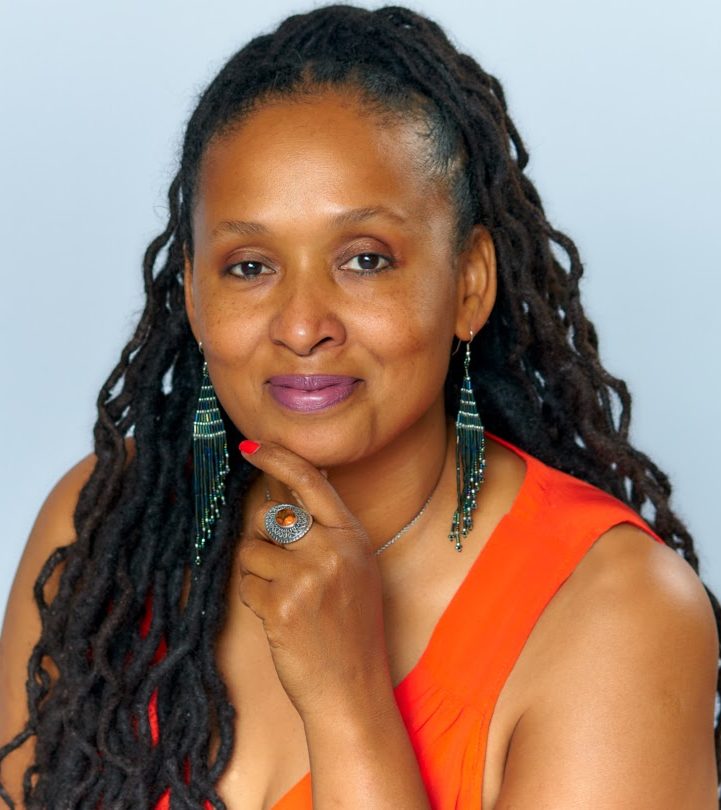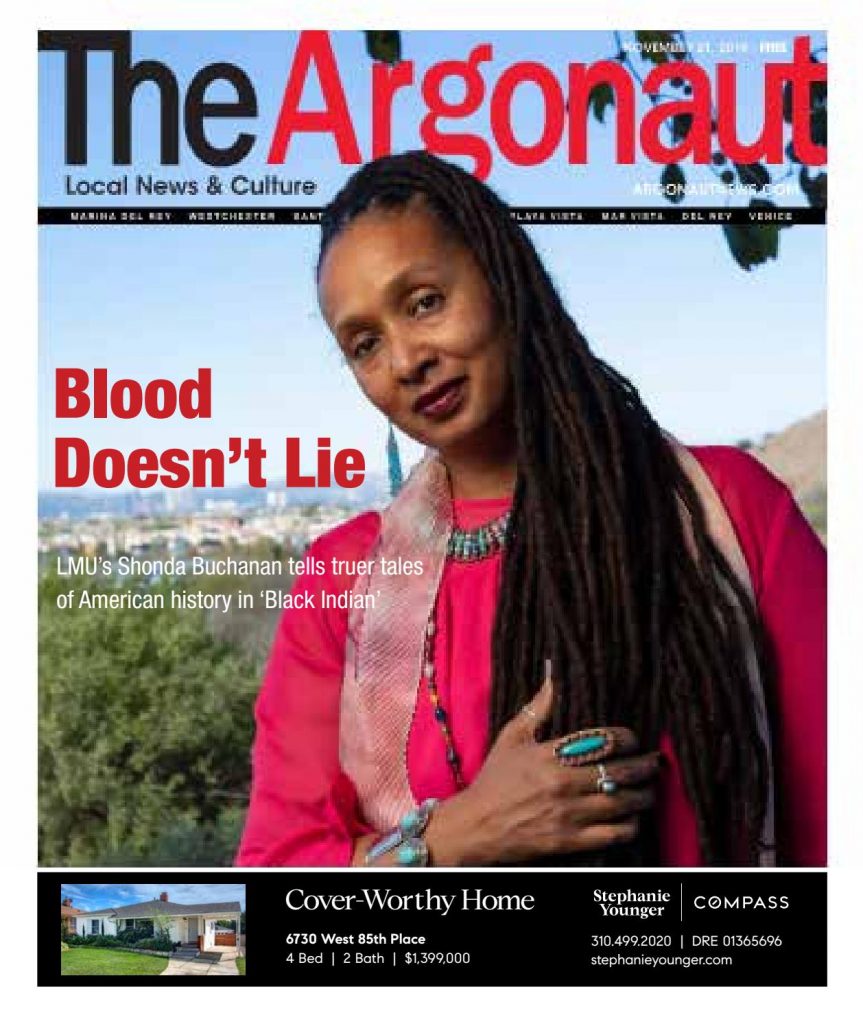About shonda buchanan
Biography
Pushcart Prize nominee, Oxfam Ambassador, USC Los Angeles Institute for the Humanities Fellow and City of Los Angeles (COLA) Department of Cultural Affairs Master Artist Fellow, Shonda Buchanan is the author of five books, including the award-winning memoir, Black Indian. Shonda is also a faculty member in Alma College’s MFA Program in Creative Writing.
An award-winning poet, fiction, nonfiction writer, and educator, Shonda is the recipient of the Brody Arts Fellowship from the California Community Foundation, a Big Read grant from the National Endowment for the Arts, several Virginia Foundation for the Humanities grants, the Denise L. Scott and Frank Sullivan Awards, and an Eloise Klein-Healy Scholarship. Consulting Curator Poet for The Broad Art Museum, Shonda is also a Sundance Institute Writing Arts fellow, a PEN Center Emerging Voices fellow and a Jentel Artist Residency fellow. Finalist for the 2021 Mississippi Review poetry contest, Shonda’s memoir, Black Indian, won the 2020 Indie New Generation Book Award and was chosen by PBS NewsHour as a “Top 20 books to read” to learn about institutional racism. About to enter a 3rd printing, Black Indian begins the saga of her family’s migration stories of Free People of Color communities exploring identity, ethnicity, landscape, and loss. Her first collection of poetry, Who’s Afraid of Black Indians?, was nominated for the Black Caucus of the American Library Association and the Library of Virginia Book Awards.
An educator, expert in African American and American Indian literature and culture, and a journalist for over 25 years, Shonda has freelanced for the Los Angeles Times, the LA Weekly, AWP’s The Writer’s Chronicle, Indian Country Today, Westways Magazine and The International Review of African American Art. Shonda is also published in Tab Journal, the Mississippi Review, Urban Voices: 51 Poems from 51 American Poets, Black Renaissance/Renaissance Noire, Art Meets Literature: An Undying Love Affair, Phati’tude Literary Magazine, Red Ink, Strange Cargo: An Emerging Voices Anthology, Step into a World: A Global Anthology of New Black Literature, Arise! Magazine, Def Jam Poetry’s Bum Rush the Page, Geography of Rage: Remembering the Los Angeles Riots of 1992 and Rivendell.
Education Specialist for the U.S. Department of State, consultant, grant and manuscript reviewer, and/or judge for the Poetry Foundation, the City of Los Angeles Department of Cultural Affairs, and CavanKerry Press, Shonda has served as a judge for multiple writing contests, including the Library of Virginia’s Poetry Book Awards, North Carolina Arts Council Poetry Fellowship, the George Floyd Youth Justice Poetry Contest, the Amanda Gorman Youth Poetry Contest, the Virginia Commission for the Arts Fiction Contest, the Metrorail Public Art Project Poetry Contest, NAACP ACT-SO Youth Poetry Contest, the Scholastic Art & Writing Awards and the Creative Writing Youth Contest for the College Language Association.
Former board member of the Poetry Society of Virginia and Hampton Roads Writers, and founding board member of the African American Alumni Association at Loyola Marymount University, Shonda is the President of the Board of Trustees for Beyond Baroque Literary Arts Center. A national and international lecturer and workshop leader, Shonda received an MFA from Antioch University and a MA and BA in English from Loyola Marymount University, where she currently teaches.
In addition to her work as a literary activist, a teaching artist, diversity expert and a writing mentor, she has taught at Hampton University, William & Mary College (Writer-in-Residence), Cal State Northridge and Mt. San Antonio College. Currently writing a Black Lives Matter book of poetry and a collection of poetry about the Mixed race settlers of Los Angeles, Shonda is also shopping her poetry book about Nina Simone. Shonda is working on a novel, a Mixed race migration book, three screenplays and a second memoir about love, travel and spirituality. Descendant of African nations, Coharie, Choctaw and Eastern Band Cherokee and Europeans, Shonda lives and writes in Los Angeles on Tongva and Chumash land. For more information, follow @shondabuchanan or contact her at shondabuchanan@gmail.com or visit www.shondabuchanan.com. To stay in contact, sign up for her newsletter https://shondabuchanan.com/newsletter.

My Story
I was born and raised in Kalamazoo, Michigan and I spent much of my adolescence curled up in libraries, bathtubs, trees and on my front porch, reading. What a luxury I wish I had back! I don’t think my idea of writing has changed since I first started writing poetry at 8 or 9. When I was younger, I used words to express myself in a world and a family that didn’t want to hear how a little Black Mixed girl felt. As an adult, I still use language to express myself in a world that sometimes doesn’t want to hear what a Black woman or Indian woman, or a Mixed blood feels. That has not changed for me, and unfortunately, society. This is where I begin. I’m always writing towards the thought of how can I use my craft to explore, explain, testify, investigate, celebrate the things happening around me. Currently, I live, write and teach in Los Angeles, celebrating the power of language with my friends, students and colleagues. Join us!
Educator
For the last 25 years, Shonda Buchanan has been teaching Writing Workshops, online and at various universities (Loyola Marymount University, Hampton University and William & Mary), and in the community, nationally and internationally. Author of five books, Shonda Buchanan is author of the memoir, Black Indian, a collection of poetry, Who’s Afraid of Black Indians?, which was nominated for the Black Caucus of the American Library Association and the Library of Virginia Book Awards, and her third collection of poetry, Equipoise: Poems from Goddess Country. An award-winning poet and educator, Shonda is a Sundance Writing Arts Fellow, a California Community Foundation Fellow, a PEN Emerging Voices Fellow and Literary Editor of Harriet Tubman Press.
Shonda’s poetry and essays have been featured in numerous anthologies such as The Seventh Wave, Urban Voices: 51 Poems from 51 American Poets, Silver Birch Press, Art Meets Literature: An Undying Love Affair, A Def Poetry Jam, Step into a World: A Global Anthology of the New Black Literature, Geography of Rage: Remember the Los Angeles Riots of 1992, and Catch the Fire!!! A Cross-Generational Anthology of Contemporary African-American Poetry, Rivendale, WhatFreshWitchIsThis?, and LongStoryShort. An active board member of Beyond Baroque Literary Arts Center, and a Women’s Traditional dancer and singer, Shonda received an MFA at Antioch University and currently teaches at her alma mater, Loyola Marymount University in Los Angeles. Follow @shondabuchanan or contact Shonda at shondabuchanan@gmail.com.
Teaching Philosophy
A commitment to diversity means developing culturally inclusive lesson plans and teaching from a culturally inclusive pedagogy that allows of color, LGBT and disabled students to see themselves in the materials studied. I consistently demonstrate this kind of commitment every class when I teach African American, Asian American and Latino/a essayists and fiction authors. I demonstrate this commitment when I conference with ESL and minority students to close the learning gap between them and students who were a little better prepared for college.
I demonstrate my commitment to diversity by listening to my students’ fears, anxieties and learning issues, then devising or revising a lesson to speak directly to this issue. More often than not, at least half the class is already dealing with the same issue. Listening for the “unspoken” problem is key. Having taught in ethnically and economically diverse classrooms for the last seventeen years, I am acutely aware of and sensitive to the different learning levels of minorities, the affluent and immigrant, first generation, special needs, and ESL students, as well as traditionally underrepresented and underprepared populations. Yet, these differences can also often lead to the most powerful discussions, assignments and presentations.
I love teaching! I believe that each person who shows up in my classroom has something to contribute. Their ideas, upbringing, culture, race, ethnicity, gender, sexual orientation, region, languages, and whatever knowledge they have the moment they sit down, are all important. Then we get down to the business of exchanging ideas — verbally and in writing. As a professor, writer and researcher, and a creative writer, my pedagogical goals have always been to engage and teach students how to develop and strengthen basic fundamental writing and reading skills; write and read both critically, analytically and creatively; conduct research; recognize, analyze and replicate rhetorical strategies and conventions of studied genres; to write for discovery and exploration, but also to fall in love with language and what language can do in our lives.
Like the literature itself, and as a cultural competency expert, my students learn to engage in social, cultural and political discussions and examine society in a way that helps them challenge, interrogate, confront and understand issues of selfhood and community, class and culture, environment and gender. Through an interdisciplinary approach, the traditional classroom setting, blended and online learning, I am particularly interested in helping students explore the intersections between culture, civic engagement, activism and rhetoric. To this end, depending on the course’s student learning outcomes, I introduce a range of short stories, essays, novel excerpts, poems, articles, films, digital media and learning platforms that illustrate course material yet which also exhibit the influence and contributions of literature as well as the impact of storytelling.
As a culturalist, a writer and an academician, I thrive upon introducing incendiary discourses that help students think and write critically about their place and role in the paradigms. I love teaching, and I particularly love being that engaged professor who directs students towards the moment when that light turns on in their minds and their writing, showing that “the learning” has indeed occurred.
For Tips and College Prep Seminars for College Students and Parents, click here.
Learn more about Shonda
Writer
Written poems, short fiction, creative nonfiction, essays, screenplays, and grant proposals.
